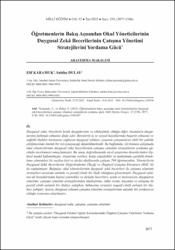| dc.contributor.author | Karamuk, Elif | |
| dc.contributor.author | Dulay, Sabiha | |
| dc.date.accessioned | 2023-09-29T09:14:47Z | |
| dc.date.available | 2023-09-29T09:14:47Z | |
| dc.date.issued | 2023 | en_US |
| dc.identifier.citation | Karamuk, E. & Dulay, S. (2023). Öğretmenlerin Bakış Açısından Okul Yöneticilerinin Duygusal Zekâ Becerilerinin Çatışma Yönetimi Stratejilerini Yordama Gücü . Milli Eğitim Dergisi , 52 (239) , 2077-2106 . DOI: 10.37669/milliegitim.1149350 | en_US |
| dc.identifier.issn | 1302-5600 | |
| dc.identifier.uri | http://dx.doi.org/10.37669/milliegitim.1149350 | |
| dc.identifier.uri | https://hdl.handle.net/20.500.12941/153 | |
| dc.description.abstract | Duygusal zekâ, bireylerin kendi duygularının ve etkileşimde olduğu diğer insanların duygularının farkında olmasını ifade eder. Bireylerin iş ve sosyal hayatlarında başarılı olmasını ve sağlıklı ilişkiler kurmasını sağlayan duygusal zekânın, yaşanan çatışmaların etkili bir şekilde çözülmesinde önemli bir rol oynayacağı düşünülmektedir. Bu bağlamda, söz konusu çalışmada okul yöneticilerinin duygusal zekâ becerilerinin çatışma yönetimi stratejilerini yordama gücünün incelenmesi amaçlanmıştır. Bu amaç doğrultusunda nicel araştırma desenlerinden ilişkisel model kullanılmıştır. Araştırma verileri, kolay ulaşılabilir ve maksimum çeşitlilik örnekleme yöntemleri ile seçilen özel ve devlet okullarında çalışan 299 öğretmenden, Yöneticilerin Duygusal Zekâ Becerilerini Değerlendirme Ölçeği ve Örgütsel Çatışma Envanteri (ROC II) ile toplanmıştır. Bulgular, okul yöneticilerinin duygusal zekâ becerileri ile çatışma yönetimi stratejileri arasında anlamlı ve pozitif yönde bir ilişki olduğunu göstermiştir. Duygusal zekânın alt boyutlarından kişisel yetenekler ve iletişim becerileri, uyum ve motivasyon, duyguların yönetimi; çatışma yönetimi stratejilerinden tümleştirme, ödün verme, kaçınma ve uzlaşma ile pozitif yönlü anlamlı bir ilişkiye sahipken, hükmetme stratejisi negatif yönlü anlamlı bir ilişkiye sahiptir. Ayrıca, duygusal zekanın çatışma yönetimi stratejilerinin anlamlı bir yordayıcısı olduğu sonucuna ulaşılmıştır. | en_US |
| dc.description.abstract | Emotional intelligence refers to individuals being aware of their own emotions and the emotions of other people with whom they interact. It is thought that emotional intelligence, which enables individuals to be successful in their work and social lives and to establish healthy relationships, will play an important role in effectively resolving conflicts. In this context, the aim of this study was to examine the predictive power of school administrators’ emotional intelligence skills on conflict management strategies. For this purpose, the correlational model, one of the quantitative research methods, was used in the study. The data was collected from 299 teachers working in private and public schools selected through convenience and maximum variation sampling with the Evaluation Scale of the Administrators’ Emotional Intelligence Skills and Rahim Organizational Conflict Inventory (ROC II). The findings revealed that there was a significant and positive relationship between emotional intelligence skills and conflict management strategies. Personal abilities and communication skills, adaptability and motivation, and management of emotions of emotional intelligence’s sub-dimensions have a positive and significant relationship with integration, obliging, avoidance and compromise of conflict management strategies, while the domination strategy has a negative significant relationship. It is also indicated that emotional intelligence had significant predictive value for conflict management strategies. | en_US |
| dc.language.iso | tur | en_US |
| dc.publisher | Dergi Park | en_US |
| dc.relation.isversionof | 10.37669/milliegitim.1149350 | en_US |
| dc.rights | info:eu-repo/semantics/openAccess | en_US |
| dc.subject | Duygusal zeka | en_US |
| dc.subject | Çatışma | en_US |
| dc.subject | Çatışma yönetimi | en_US |
| dc.subject | Emotional intelligence | en_US |
| dc.subject | Conflict | en_US |
| dc.subject | Conflict management | en_US |
| dc.title | Öğretmenlerin bakış açısından okul yöneticilerinin duygusal zekâ becerilerinin çatışma yönetimi stratejilerini yordama gücü | en_US |
| dc.title.alternative | The predictive power of emotional ıntelligence on conflict management strategies of school principals from the perspective of teachers | en_US |
| dc.type | article | en_US |
| dc.authorid | Elif Karamuk / 0000-0002-5866-995X | en_US |
| dc.department | Rektörlük, Rektörlüğe Bağlı Birimler, Türk Dili ve Edebiyatı Bölümü | en_US |
| dc.contributor.institutionauthor | Karamuk, Elif | |
| dc.identifier.volume | 52 | en_US |
| dc.identifier.issue | 239 | en_US |
| dc.identifier.startpage | 2077 | en_US |
| dc.identifier.endpage | 2106 | en_US |
| dc.relation.journal | Milli Eğitim Dergisi | en_US |
| dc.relation.publicationcategory | Makale - Uluslararası Hakemli Dergi - Kurum Öğretim Elemanı | en_US |

















